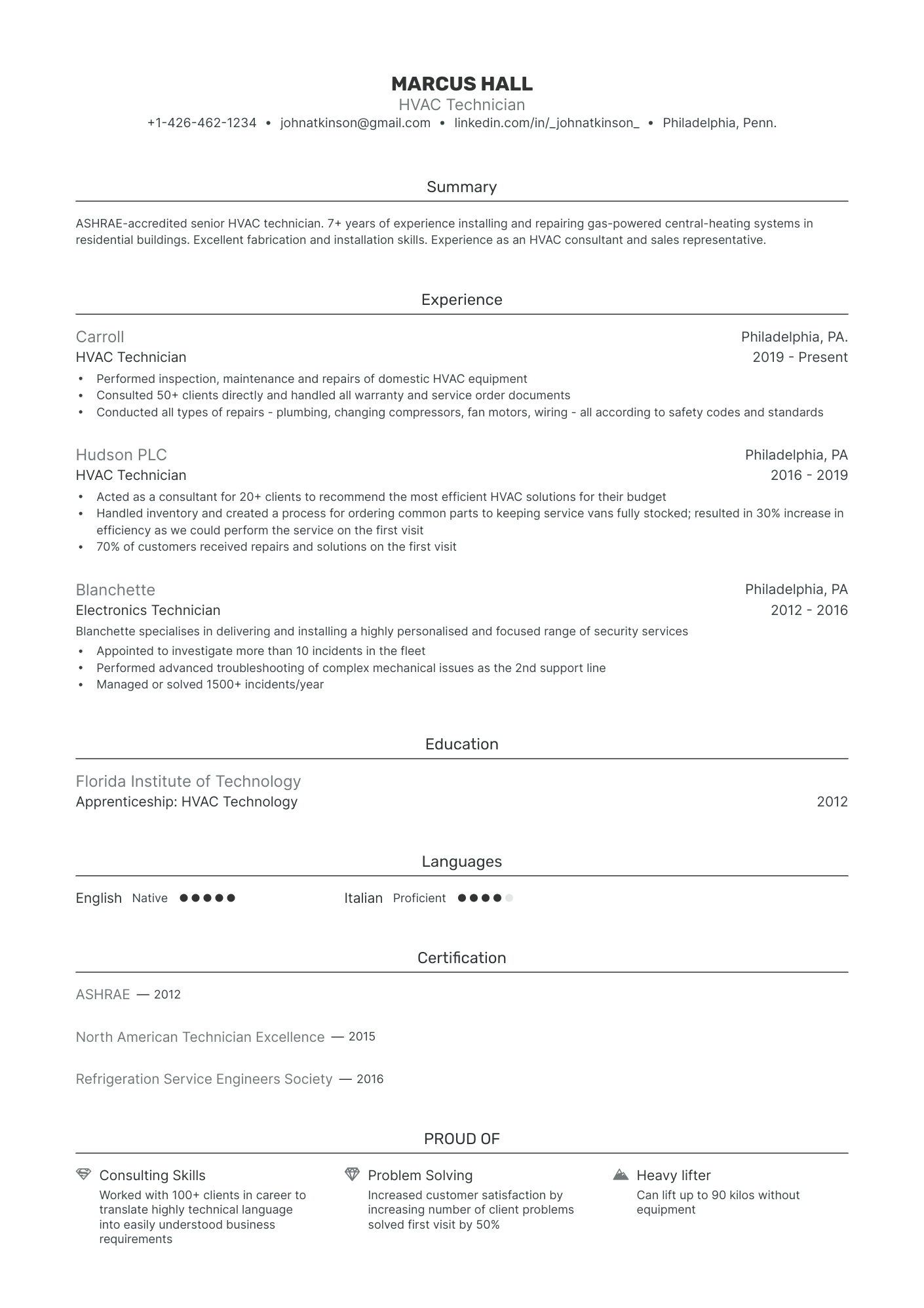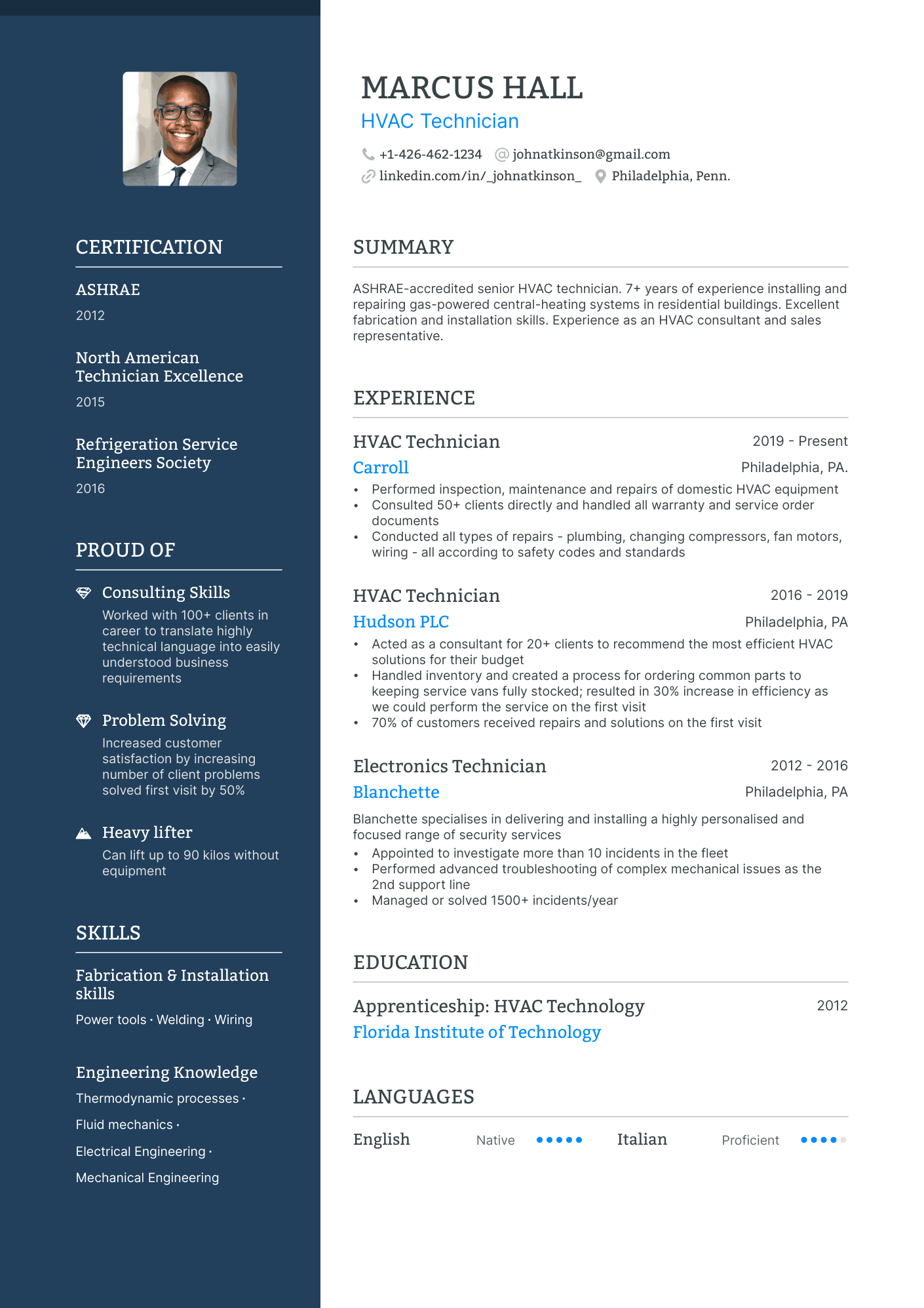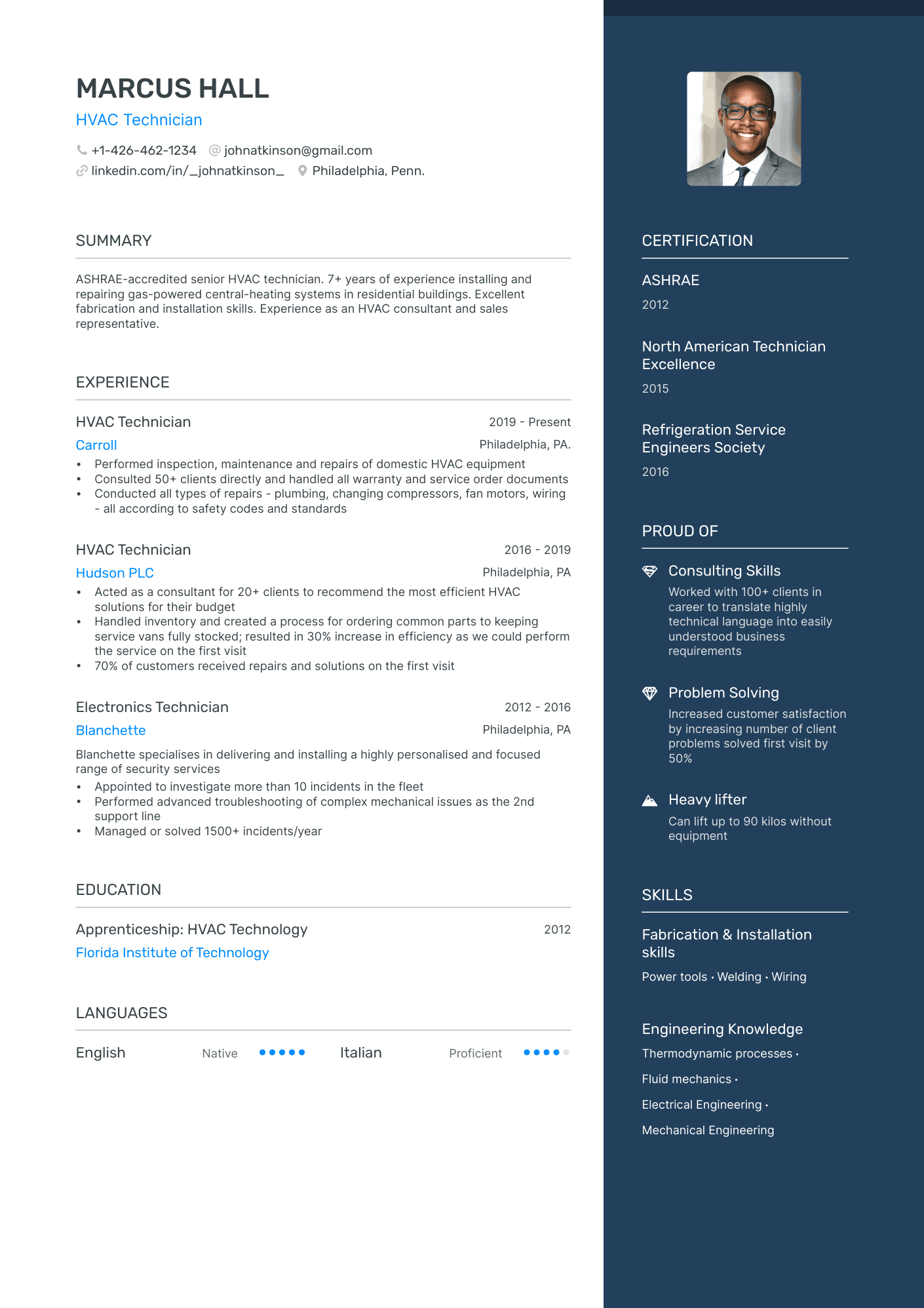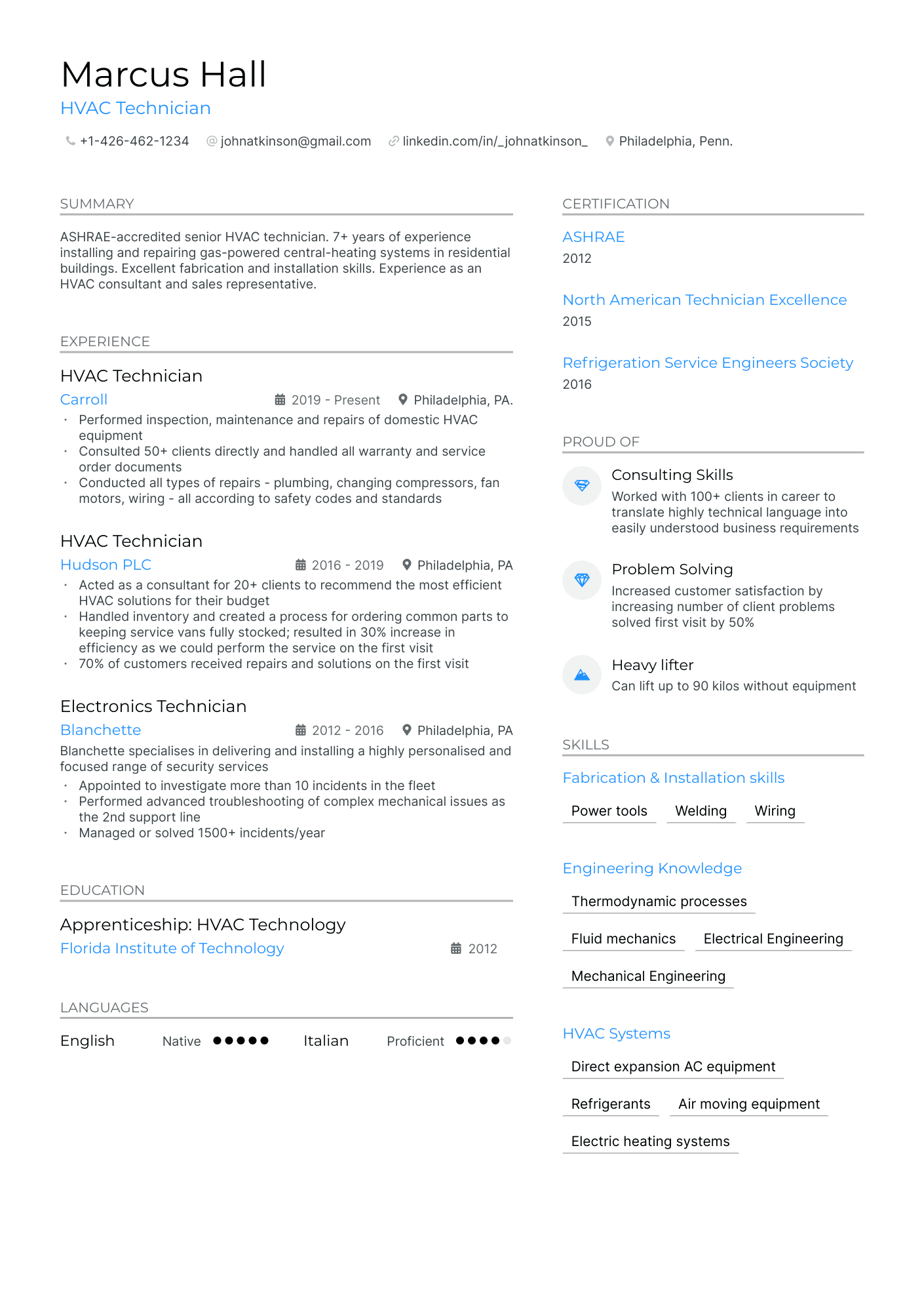You can see heat loss just by looking at the concept render. You can feel pressure changes going in and out of any building. You’re either a superhero or an HVAC engineer.
They won’t make a movie about you, but you’re the real hero during Nevada summers and Minnesota winters.
Both mechanical engineers specializing in HVAC and HVAC technicians and installers have a good outlook in terms of job security and availability in the next decade.
If you’re feeling some heat and pressure to land an interview, it may just be your HVAC resume leaking beyond repair.
Today, we’ll show you how to write a proper HVAC resume
- Inspect and troubleshoot 10+ HVAC resume examples - both for technicians and engineers
- Learn how to analyze the job description and talk the language of your recruiters
- Create an organized and efficient header section
- Write a stunning career summary and break up the ice
- Prove your value with a confident and results-oriented work experience section
- Emphasize on your mastery of thermodynamics with a clear-cut skills section
- Provide reassurance with a well-rounded education and certification section
Let’s get started!
Explore relevant engineering resumes here
How to write an HVAC resume
Put yourself in your recruiter’s shoes and consider the following:
They are listing through dozens of resumes from HVAC technicians and engineers.
Recruiters will likely spend 30 - 60 seconds on your resume and you have this much time to convince them you’re worth a second look.
Try to answer the following questions:
- Does your HVAC resume demonstrate problem solving abilities, 3D thinking and dominating grasp over thermodynamics?
- What scale of HVAC systems have you worked with - houses, office buildings, cruise ships, skyscrapers?
- Do you back your claims with facts and results from your completed HVAC projects?
- How does this all stack against the requirements listed in the job description?
Your HVAC resume needs to be properly structured, using an easy to read font, and include several sections reviewers will expect to see.
Keep in mind, big companies frequently use automated review software which can discard your HVAC resume if it doesn’t list any of the desired features.
Don't forget these 5 sections for a job-winning HVAC resume
- Header section
- Professional summary or entry-level objective
- Work experience section
- Technical and soft skills section
- Education and certification
Each HVAC resume is unique. There’s a difference between applying as a mechanical engineer specializing in HVAC systems or an HVAC installer and technician.
That said, the laws of thermodynamics are the same for all. Hiring managers will be looking for a handful of skills and traits which come natural to HVAC professionals.
Here's what recruiters agree upon when it comes to HVAC technician resumes:
- Problem solving and spatial thinking
- Strong grasp of fluid mechanics, thermodynamics
- General mechanical and electrical engineering abilities
- Knowledge of common HVAC equipment - boilers, pumps, compressors, condensers, heat exchangers, pressure sensors, thermometers and controllers
- Experience with HVAC systems in civil engineering projects
- Working knowledge of common CAD software used in the respective industry
- HVAC specific CAD software like Wrightsoft Right-J8
- AutoCAD and BIM software for the construction industry
- Aveva Marine and similar for the marine industry
- Ansys, SimScale and others for CDF simulations
- Reading technical documents, drawings, schematics and other
- Be well versed in the standards and codes maintained by the ACCA
- Fabrication, welding and assembly skills and practical experience
- Project management, organization and planning
- Experience working with customers and orders
What’s the best way to select HVAC resume templates that work
There are a lot of things you want to communicate to your recruiter. Аt the same time, HVAC resume should be only 1 page long.
In order to work around this problem, you should start with an efficient HVAC resume layout.
- Single-column - Preferred for HVAC apprentice resumes and mechanical engineering student resumes seeking entry level positions in the HVAC industry.
- Double-column - Recommended for HVAC engineers and HVAC installers who have some experience and skills to showcase.
- Condensed - A well packed version recommended for senior HVAC technicians, HVAC engineers and HVAC project managers with lots of projects and certificates.
- Creative- Generally not suitable for HVAC professions. Senior HVAC engineers may not take you seriously with a graphics-heavy resume.
Set the tone with an eye-catching HVAC technician resume header
The header section is a straightforward but very significant part of your resume. It’s the only place where you get to put your name and contact details.
You must always triple check whether your information is properly spelled out, clear to ready and easily identifiable.
If a recruiter has to work hard to contact you for a job interview, they’ll just drop your application and pick another one.
Let’s review two HVAC resume samples and see where they got it right and wrong.
2 HVAC resume header examples
On first glance this HVAC resume is not that bad. But it’s definitely not a great one either.
Depending on the job description “AC repairman” may be valid title, but it doesn’t sound very professional. The email is equally unimpressive. The candidate hasn’t invested too much effort on presentation.
Another troubling issue is the lack of a complete address. ATS (applicant tracking systems) software can flag this as an error and block this resume.
You’re not required to include your full mailing address, but as a bare minimum, add your city and state.
Let’s see another HVAC resume example which fares better.
This HVAC resume sample is well rounded. The title and email are descriptive and take the chance to add the main keyword. You’ll learn why that’s important further down.
The applicant shows attention to detail, listing a more detailed address and their Linkedin account. It can offer a ton of additional information to interested recruiters.
How should you frame your HVAC resume summary?
Depending on the number of HVAC resumes on their desk, a hiring manager may choose to read the header and summary of each applicant and filter the bad ones out.
You have just a few sentences to push through all critical information and deliver an impact which lands your HVAC resume in the right pile.
Open up with your experience and the highest title held.
Continue with the type of projects and HVAC systems you’ve worked on.
Finish your HVAC summary by listing your professional certifications and CAD software you use.
All of this must be carefully matched to the keywords and requirements listed in the job offer. Recruiters will be looking for similar language and will notice if your application is relevant.
Go through the next HVAC resume example summaries. Which one is more impactful?
This HVAC summary is not very impressive. It sounds more like a job description.
It’s unknown exactly which field they work in. There’s no mention of any HVAC accreditation or education details. Nothing to back up their claims.
In a competitive environment, other HVAC technicians will take the opportunity to talk about their biggest achievements, not chew on their daily job.
This HVAC summary is slightly longer, but much more impactful. ASHRAE is one of the oldest and most respected industry bodies. It is a major trust factor and definitely a detail you want to include in your HVAC resume summary.
Outside of that, this applicant has done a good job rounding up their experience and skills. The sentences are short, concise and easy to read.
Entry level? Then a HVAC resume objective is what you need
Okay, so you’re not an ASHRAE member and you don’t have a decade of experience.
You want to get into the trade and you’re halfway through your HVAC associate certificate. What do you say in your HVAC resume objective?
Even if you’re an entry-level HVAC installer, you may have relevant experience without realizing.
- If you ever worked as a builder, plumber or electrician, you most likely have decent technical skills to get started with HVAC.
- If you have a passion for cars and relevant mechanic experience you may look for HVAC jobs in the automotive sector.
Finally, don’t forget to mention the keywords, activities, equipment and tools you found in the job description.
Here are a few HVAC resume sample objectives.
This is a well structured HVAC resume objective. The candidate sets forward their expectations and defends their claims with relevant experience and skills.
The language used covers a number of keywords which you’ll see in HVAC job offers. There aren’t any unnecessary words. Each sentence adds more information to paint the bigger picture.
This is another successful HVAC objective. The candidate opens with their education details, followed by expectations.
They back it up with their CAD skills and internship experience in CFD simulations, both of which are invaluable for the job they are targeting.
Get the objective right and your resume will most likely make it to the next round of reviews.
Next, you need a convincing HVAC experience section if you hope to get a call.
How to make sure your HVAC resume experience shines
If you don’t make an impression now, your HVAC resume is headed for the shredder.
Here are the most common mistakes HVAC technicians and engineers make:
- Writing generic and bland descriptions of their previous HVAC jobs
- Using vague language and offer limited information
- Going into too much detail, while failing to make a point
- Not including facts, statistics and results from their work
Often HVAC technicians write detailed descriptions of their work responsibilities. Hiring managers already know what the job is.
What they want to see is
- How fast can you service an AC?
- Do you serve clients with the proper respect and quality?
- What value did you contribute to your past employer?
- Whether you improved the process in a meaningful way?
We’ll analyze two HVAC technician resume samples below.
HVAC resume experience examples
- •Communicated with clients and inspected broken AC units.
- •I checked warranty and if everything was alright I filled in the orders.
- •Most jobs were maintenance and testing if everything works fine
- •I was responsible for cleaning and maintaining inventory at the shop
We aren’t impressed with this one. It’s rather vague and we don’t really get any details about their work.
The language is not very suitable for a formal document. Avoid using “I” and use the official HVAC terms.
- •Performed inspection, maintenance and repairs of domestic HVAC equipment.
- •Communicated with clients directly and handled all warranty and service order documents.
- •Conducted all types of repairs - plumbing, changing compressors, fan motors, wiring - all according to safety codes and standards.
- •Acted as a consultant for clients and recommended most efficient HVAC solutions for their budget.
- •Handled inventory and created a process for ordering common parts and keeping service vans stocked to perform the service on the first visit.
- •70% of customers received repairs and solutions on the first visit.
This HVAC resume sample is way more impressive.
The candidate sounds well-rounded with experience in multiple aspects of the HVAC service industry. They are a technician, but also handle customer service and store operations.
With mastery over the whole process, this HVAC technician has improved the service, streamlining activities and reducing necessary travel time and visits. Cheaper for the boss, less of a chore for clients.
Employers want to see expertise and efficiency in every HVAC technician they employ.
Don’t underestimate the importance of your HVAC resume skills section
Recruiters want to look at your resume and immediately identify the skills required by the employer.
A skills section will instantly inform them what areas of HVAC you excel in without having to actually read your resume. Obviously, that means adding keywords found in the job description.
How to list tech skills on your resume
HVAC technicians need а good range of engineering and technical skills to conduct their trade.
Here are a few more HVAC technical skill ideas:
Top 7 technical skills for HVAC resume
- Scientific / engineering knowledge
- Thermodynamic processes, heat transfer
- Fluid mechanics and air flow
- Electrical engineering, instrumentation and controls
- Mechanical engineering, pumps, compressors, fans
- HVAC systems and equipment
- Gas-fired and electric heating systems
- Direct-expansion AC equipment
- Refrigerants
- Low voltage temperature-control systems
- Air moving equipment
- Ducting and ventilation systems
- Plumbing
- Fabrication and installation skills
- Power tools
- Welding
- Wiring
- Good physique - vital for working full time on the site.
- Technical documentation
- Reading blueprints, drawings
- Repair and service orders
- Warranty documents
- Compliance codes and regulations
- CAD Software
- SolidWorks
- Revit
- Rhino
- CRM Software
- Office software
- Excel
- Word
- CRM software
How to describe soft skills on your resume
Soft skills are often missing from HVAC resumes.
Your customer service skills are of utmost importance. No matter how good of a technician you are, unless you treat customers with respect and attention, you’ll have a hard time on the job.
Here are some more HVAC soft skill ideas.
These are the most wanted HVAC soft skills on resumes
- Customer service
- Communication
- Project management
- Time management
- Organization
- Motivation and drive
- Analytical thinking
- Safety practices
- Attention to detail
- Reliability
- Accuracy
How to make my HVAC resume education section useful
There are several different ways to get into the HVAC industry
- Trade-school or community college - 6 months to 2 years of classroom lectures and practical training
- Apprenticeship - 3 to 5 years working as an apprentice to a professional HVAC journeyman
- University - A Bachelor’s degree in mechanical engineering will get you into numerous HVAC engineering positions. A Masters will allow you to apply for management positions.
Each comes with a different type of HVAC certification, giving you access to different types of work. It’s important that you’re legally certified for the job you’re applying to.
Some employers are willing to pay for additional certification. But unless it’s specified in the job description, be ready to uphold your responsibilities from day one.
If the job description requires a certain HVAC certificate and you have it, make sure to also include it in your summary.
Place your education details in a clear to read section.
For senior HVAC technician resumes, position your education after your work experience.
For entry-level HVAC engineer resumes, move the education section up if you haven’t had many opportunities to work.
How to position certifications on my HVAC resume
Top 7 HVAC certificates for your resume
- American Society of Heating, Refrigerating and Air-Conditioning Engineers
- North American Technician Excellence
- Air Conditioning Contractors of America
- HVAC Excellence
- EPA Section 608 Technician Certification
- Refrigeration Service Engineers Society
- HVAC State Certification and Licensing - 35 states offer certification for HVAC technicians
If you are a holders of any of those, make sure you list them in a visible certification section, or near you education.
Final points and takeaways
- For maximum effect, tailor your HVAC installer resume specifically for the job you’re applying to.
- Analyze the job description and copy its style, language and keywords most frequently mentioned.
- That said, don’t make the mistake of putting false or misleading information just to get an interview. It won’t end well in the long run.
- Use your header strategically to squeeze in an extra detail without robbing its functionality.
- Your HVAC resume summary is a decisive section. That’s where recruiters determine whether to read the rest of your resume.
- The work experience section is where hiring decisions are usually made. Showcase what value you have brought to your previous employers.
- Don’t forget about the skills section. It’s an important piece of the resume of every modern job seeker.
- Drive the final nail in the coffin with a well rounded compact education and certification section.




